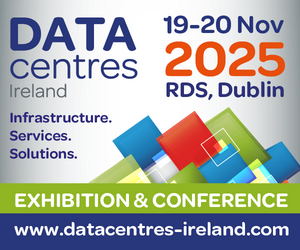You know that something in our beloved ICT sector has become a bandwagon when the politicians jump on. Our Irish ones have been on board the cloud without parachutes for a couple of years. Now the seductive simplicity of Big Data (short words, very good) has apparently won our government over. In fairness, the recently announced EUR*300 million funding for industry/academia research is obviously driven by professional advice and we should welcome the fact that ICT is one clear and focussed element.
The Big Data and Analytics Research Centre is an important partnership that will integrate four world class research centres and work with 45 industry partners. Assuming that the funding is split fairly evenly between the initiatives, however, that actual bottom line for the BDARC will be just over EUR*7 million a year, of which just under EUR*5 million will come from government. To be blunt, it’s just not very much.
The press announcement burbles about ‘Big Data, a sector currently growing at up to 40% per annum’ which rather begs the question of whether Big Data is a sector at all in any sense that is meaningful to economic development. The level of understanding by our political masters was epitomised by the curious statement by our Minister for Research and Innovation who told Morning Ireland that "The average GP prescribing drugs for instance gives rise to a minefield of data…" It does suggest a wonderful vision of Big Data in which our intensive analysis could indeed discover unexploded ordnance (political scandals, ideally, and uncomfortable truths) but alas data mining is seldom so satisfactorily dramatic.
M2M rising
But the focus is good. The digital future is soft and virtual, as this column suggested last month. It is already and will from now on always be about what we modestly endowed humans wish to accomplish with the combination of our own brains and the power of machines. Those machines will develop and mutate and we may even reach a stage of implanted programmable units so that ‘device’ becomes an outmoded concept. Machine intelligence will certainly come into the picture, which in turn will depend on ‘understanding’ of the information we generate directly through action and content and indirectly through our geometrically expanding M2M data. Advanced analytics, in other words.
Right now, back here in the real world of work, it has become clear that business software has moved well beyond specific task-related applications. The accounting need for a sales ledger has not changed but it is now an organic element in a dynamic business management system. The market moved us on from financial accounting to enterprise resource planning (ERP), itself initially a slightly clunky expansion of software from the manufacturing and supply chain world. The distinction between services-now extended to online and entertainment content-and transportable goods is still going to be important until we get to teleportation. Supply chain is arguably today’s production function rather than the actual factories.
But all types of business have more in common than otherwise and it has also become blindingly clear that two strands are crucial for the future: collaboration and knowledge management. The human history of team work extends from bands of hunter gatherers through fighting units to sports teams-still the reference points for sales teams and ‘motivational’ exercises. But of course in practice most collaboration has been in the face of challenge or common enemy or emergency or deadline. In between we can readily shed the habit and revert to cosier heart and hearth relationships. It could even be suggested that effective collaboration is actually a conscripted behaviour rather than any basic human impulse.
Whatever truth there may be in that observation, the advent of personal computing and untethered mobile ICT has raised the level of personal independence in work, especially in service industries and at leadership level. ‘Team leaders’ today tend very often to be virtual roles, in complete contradiction to such accumulated wisdom as there is in organising collaboration in work and teams and armies. When every worker is ‘empowered’ maybe there is in the end a dilution of responsibility.
Distance learning
We have developed very smart communications systems, from email to IM to videoconferencing and desktop sharing. Now collaboration in the cloud is being touted as another ‘next big thing’ and it probably is, given the infinite flexibility and ease of working with multiple, layered relationships. Of course all of these tools are thoroughly useful and valuable. But note that they are all predicated on distance between the people communicating and in turn may actually serve to accentuate the deficiencies of that separation. Emails across the office? Ireland being inhabited by us the Irish, we are possibly still a little better than some other cultures at keeping the personal and verbal touch. It is noteworthy that we still use the phone for business at a very high frequency level, although our outstanding national volume of texting might give pause for thought.
The other huge elephant in the virtual room is information sharing. Our ability to manage knowledge is still in potty training. You can’t pass on everything you know or learn so how do you know or decide what might at some stage be of value to someone else? Corporate Big Brother can search into your hard drives and email and everything else. A bit OTT, but you can always sign up for it as an employment condition. Data management experts (sorry, ‘data scientists’) have been tackling the challenge of data silos for years so the systems should be there. You think?
The human element is the primary flaw. If bosses are monitoring everything, the obvious response is to be careful about what you allow the systems to know. As every office politician knows, private speech is by far the best way to play the games. Less cynically, part of the whole point about collaboration is that it should be spontaneous and immediate. Allowing members of a team to access the same files or progress reports is essential but really it is just sharing the formal recorded history and is certainly not the same as the collective memory of people who have actually worked and talked (and possibly socialised) together.
Unfortunately, in a virtual team with overlapping relationships and the inevitable changes and movements of people over often quite short periods of time much of that collective experience and knowledge is going to be lost anyway. In fact it was ever thus. All of which does point to search and analytics as the only line of development likely to yield workable much less effective results in corporate knowledge management.
The pundits are currently including social networking in the application of analytics to Big Data. One can see why it could be valuable to all sorts of interests from marketing to politics to social science. We can also presume that whatever algorithms are developed could also be applied to similar information within the enterprise and in collaboration or partnership groups like supply chains. But we still come back to that human problem. Language and text, when recorded, are positively formal and structured by comparison with the codes and shorthands of informal, spontaneous human interaction. Often that is where the individual and to some degree collective team memory actually has most value. "Yer man the annual purchasing contract negotiator has a dead giveaway-he always looks down and fiddles with his pen when he’s bluffing on price." Simple observation and memory, possibly worth serious bottom line money.
Standing back a bit, what all of this means is that between ICT and organisational management we are well into a 21st century work culture that is radically different from the past. In many respects we have lost the disciplines and formality of 19th and 20th century administrative processes (memos, files, minutes of meetings) without replacing them with a complete set of digital equivalents. In areas where compliance is mandated or post hoc legal action always a threat, recording and logging is facilitated by smart tech. But the point is that informal and ad hoc working is now the default. That means that corporate knowledge-intellectual property by another name-leaches out of the organisation daily.
CIOs in particular, and all of their colleagues in the C-suite and board level, have to come to grips with today’s transformed corporate culture. Some of the answers have to be developed through deeper management training-something which became almost unfashionable in the last couple of decades. We rightly expect ICT to provide the platforms for the way we work, whatever that might be. For the foreseeable future, that means the twin development tracks of collaboration and knowledge management or whatever we agree to call that evanescent corporate asset. Are CIOs prepared or are they still preoccupied with choices of hard and soft systems? It’s time to raise the head and scan the horizon. That’s what leaders are supposed to do.








Subscribers 0
Fans 0
Followers 0
Followers